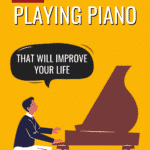Playing the piano is not only an enjoyable hobby. It is one of those lifelong skills that can have a massive impact on all aspects of your life.
There are so many benefits of playing the piano that go beyond simply making music that you love.
Playing piano helps to improve agility and hand-eye coordination, and refines your fine motor skills. It helps to strengthen your arm and hand muscles. Playing music that you enjoy can lower your heart rate and improve cardiac issues. The time you spend playing the piano can also send you into a meditative state where time appears to stand still.
We would be remiss not to mention that there are some disadvantages to playing piano, but we feel that the advantages far outweigh them. Even if you can’t read sheet music and instead enjoy sitting at the piano making sound patterns, time on the piano is always time well spent.
The benefits that come with piano playing are huge. For body, mind, and social well-being, there are so many great reasons to play piano. We’ve researched the benefits of playing piano, and here is a list of 21 of the best.
Post Contents
1. It gives your brain a workout
Of all the benefits that come from playing piano, it’s what it does to the brain that is so impressive.
Scientists discovered that when we listen to music, all sorts of amazing things happen to the brain. And when a person plays an instrument it acts as a full body-brain workout. It is especially true of the piano as there is so much to learn and remember.
Although the research is relatively new, neuroscientists have identified that when we play a musical instrument, it engages the WHOLE of the brain and explicitly targets the motor, visual and auditory areas.
With repeated practice, those brain areas will continue to grow and improve in the same way your muscles grow when you workout at the gym.
The improvements in your brain that come with practicing music may explain why musicians are good at other problem-solving skills. And we don’t just mean academic skills but other skills like map reading, drawing, and even jigsaws.
Playing the piano also benefits you if you choose to learn other instruments. Due to the complexity of learning the piano, playing other instruments may come more easily.
2. Improves your aural awareness
You may already consider yourself as having a naturally musical ear. If you pride yourself on your ability to sit down at the piano and play a song that you’ve heard without sheet music, then yes, you have an excellent musical ear.
But did you know that it works the other way around too? When you learn to play the piano, it improves your listening skills and develops your musical ear.
Not only do your listening skills improve, but you will also find it easier to pick up the emotional cues of things that are left unsaid. If you have trouble hearing music, the vibrations from a piano will resonate through your body, enabling you to listen differently.
Aural awareness also allows us to understand speech patterns, which is essential when learning a new language.
So, put learning Spanish or French, or Japanese on your bucket list. If you already play the piano, your aural awareness will be high, which can lead to increased language skills.
3. Improves your multitasking skills
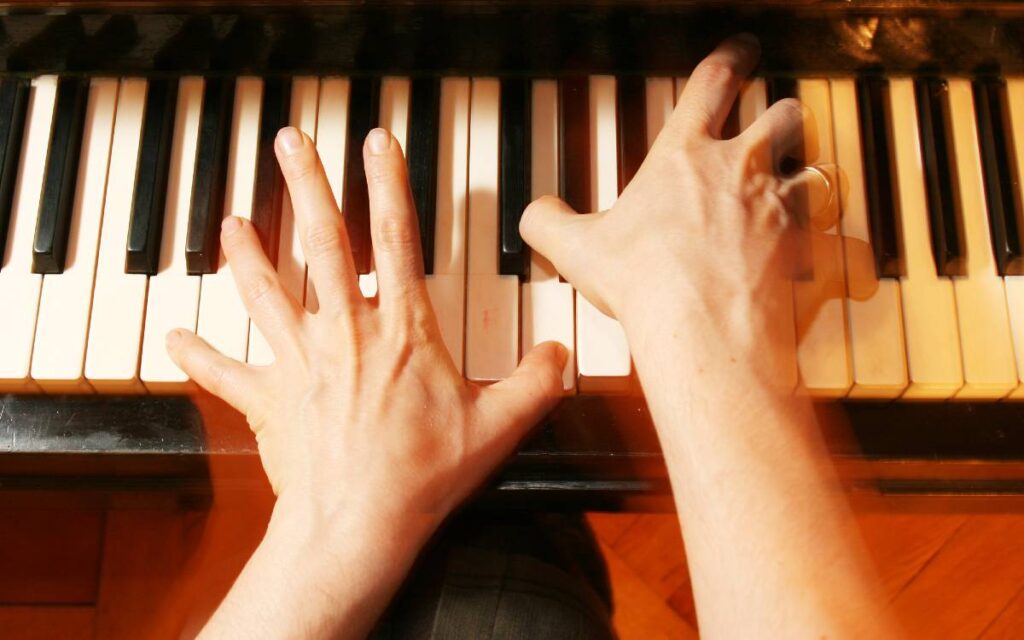
Playing the piano takes your multitasking skills to the highest level.
Piano playing requires something called split concentration. Watch piano performers and make a note of how many things they are doing at once.
Firstly, their left hand and right hand are doing two different things simultaneously. That in itself is mind-blowing.
Next, notice how they maintain the rhythm and tempo of the piece of music. That’s an example of the internal metronome that all musicians seem to have.
Piano players can make all of the above look easy. But remember, as well as producing beautiful sounds, they are making sure their fingers are in the correct position to enable them to reach the following key.
They may also be reading sheet music, which is a skill all of its own.
And let’s not forget dynamics, using the pedals correctly, sitting up straight… phew!
And while we are talking about multi-tasking, have you ever tried singing and playing the piano simultaneously? Give it a go. It is the ultimate in challenging one’s ability.
Playing the piano will build your concentration skills and help you maintain focus in other areas of your life.
4. Increases learning in children
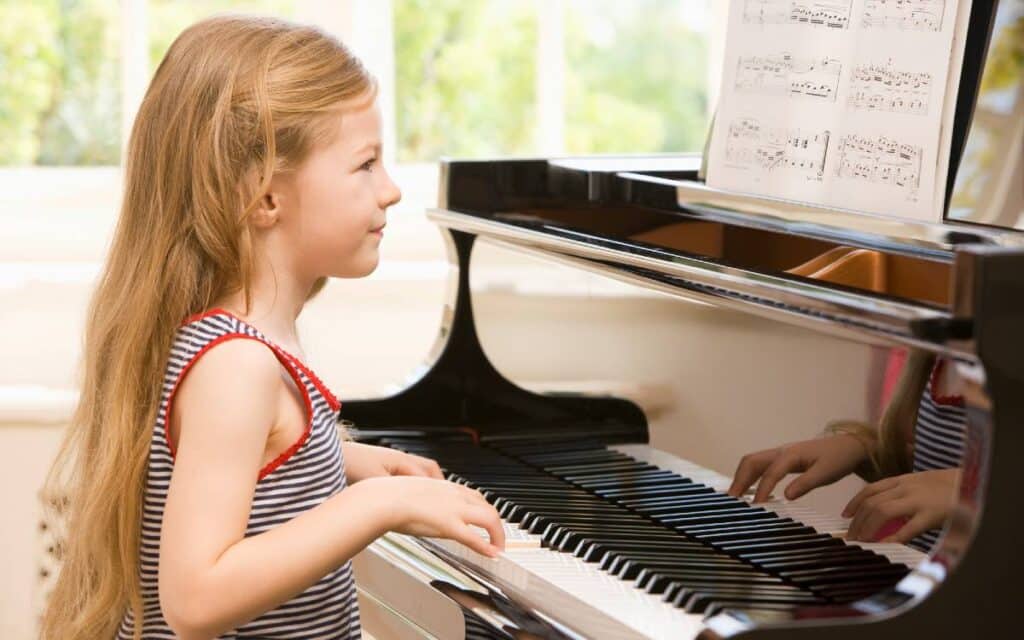
An article published in the Journal of Educational Psychology describes the work of E. Glenn Schellenberg, Ph.D.
In 2004 his studies showed that 6-year-olds who had a year of piano lessons showed a significant increase in their IQ level.
Schellenberg then built on his research and continued to study the children for several more years.
The subsequent study results showed that children‘s IQs were higher amongst the groups that had additional piano lessons or music training, and they performed better overall at school.
Playing piano from an early age offers so many benefits to children and not just an increase in their IQ.
It assists with early language development. It builds self esteem, and children who learn the piano tend to have better hand eye coordination as adults.
The research also indicated that keyboard lessons increased children’s spatial cognitive development, meaning they could learn a new language faster and were better at problem-solving studies like math.
The overall conclusion seems to be that if you want to give a child the best start in life, introduce piano lessons early and watch them thrive.
5. Reduces Stress
In 2016, the National Library of Medicine published a fascinating article by Debra Shipman, Ph.D.
Shipman looked at research done over the years on the effect of playing the piano and stress relief.
The therapeutic benefits of playing the piano were evident, especially amongst elderly adults. Playing the piano is almost like a form of meditation. It’s hard to think worrying or anxious thoughts when you’re playing your favorite music.
You don’t even have to play a piece of music. You can simply make some soothing sounds. The video below demonstrates how to turn your piano into a relaxing spa session.
6. It makes you feel happy!
In the same way that the piano reduces stress, it can also increase your happiness levels.
If you’re feeling low, listening to your favorite songs can turn your mood around.
If you want to take your happiness to the next level, go and listen to some live music. Not only will it make you feel happier, but the people around you will also be feeling happy, and that will have a huge, positive effect on your well-being.
But to really elevate your happiness levels, play the piano. Creating your own music on an instrument you love is a sure-fire way to make you feel happy and refreshed.
So, if you feel your happiness levels need a boost, put your favorite track on at full volume and dance around the kitchen. Or better still, sit down at your piano and start playing music.
7. Increases your confidence

It’s a great feeling when you first sit down at the piano and learn your first few chords or a simple tune. You can feel your confidence grow slightly.
That feeling continues as you continue with your piano practice. Like the first time that you play with two hands together. Learning how to read your first piece of music. Your first performance.
As the years go by, your piano playing will improve, and with each step along your musical journey, your self esteem and confidence grow.
Although playing for other people might feel scary at first, piano recitals can do wonders for your self esteem.
A good tip is if you don’t feel comfortable playing in front of an audience at first, you can video yourself and show them the footage.
As your piano playing confidence grows, so will your confidence to tackle other challenges in life.
8. Delays the onset of dementia
It sounds incredible, but research on older adults who have impaired cognitive functioning shows that playing piano really does help with the symptoms of dementia.
Researchers already understood the benefits of music on the brain and wanted to see how something as complex as playing a musical instrument affected elderly adults.
Participants received piano lessons and carried out regular music practice over four months. The research showed an improvement in the motor skills of the group. The older piano players displayed improved moods, and their psychological and physical quality of life improved.
It may not stop the onset of dementia, but it appears that piano study can slow down dementia and improve the lives of those already suffering from this terrible disease.
9. The piano is a social outlet

When you start to play piano, it can help you to develop a social circle. That may seem odd when you consider the hours spent alone on your piano practice.
An excellent place to start meeting new people is through having piano lessons. Your piano teacher may encourage you to take part in piano recitals where you can meet people with a similar interest. Or ask your piano teacher to introduce you to some of their other students.
As your piano playing progresses, look for opportunities to join a band or meet up with other people who just like to hang out and jam together.
It will also give you a chance to talk to others about their piano playing experience, and you could end up learning something.
10. Increase in human growth hormones
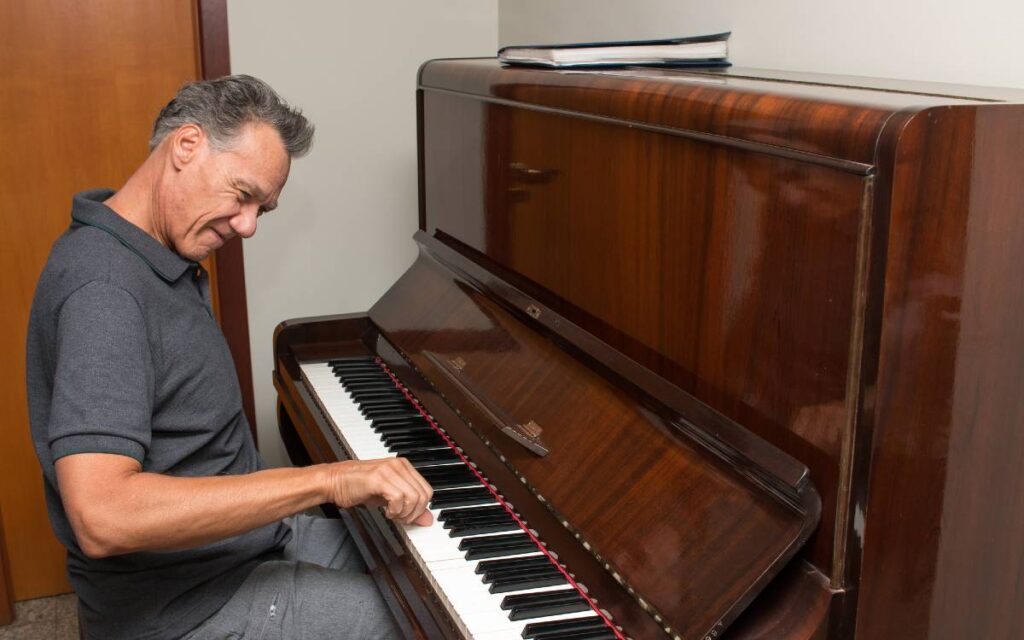
This fact is pretty impressive and almost unbelievable.
It’s the pituitary gland at the base of the brain that produces the human growth hormone (HGH), and its job is to regulate muscle, body fluids, metabolism, and bone growth.
Studies have shown that the body system of individuals who learn to play the piano contains high levels of HGH.
An increase in HGH doesn’t mean you will suddenly start growing again. Instead, HGH helps to increase muscle mass, slow osteoporosis, and increase energy levels.
As a result, you should feel fewer aches and pains and be more alert while you continue playing the piano and having music lessons.
11. Improves vocabulary in children
Children who took part in year-long music tuition showed superior cognitive performance in reading skills compared with a group of children who had no musical training. Psychology of Music published the study. The same children also demonstrated an increase in vocabulary words and math skills, which shows how important music is for development at an early age.
However, we feel sorry for the other group who in the experiment missed out on the musical training.
12. Character building
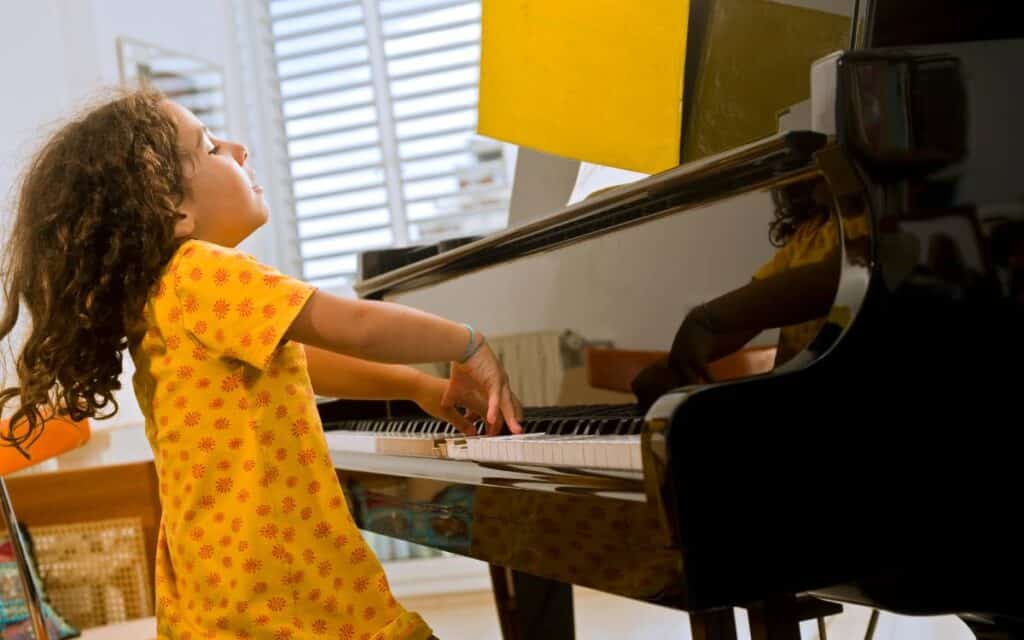
Children, or even adults, can find learning piano a real challenge. After all, if it were that easy, everyone would be learning it!
However, the determination and perseverance needed to play piano we can all use in our day-to-day lives.
It’s especially beneficial for children, and piano study can help make them well-rounded adults of the future.
13. Improves memory capacity
Learning to play a song requires a lot of brainpower! Muscle memory also comes into it, as your fingers instinctively reach for the right notes.
Memorizing one piece of music is a challenge in itself, but imagine being a concert pianist and having to remember all 30,000 notes of Rachmaninoff’s Concerto No3!
When you play piano, various parts of your brain receive stimulation, including the brain area that stores memories. Continually stimulating the same regions of the brain creates new pathways and connections.
As new connections are created, so our capacity for remembering things increases too.
14. It’s good for your hands
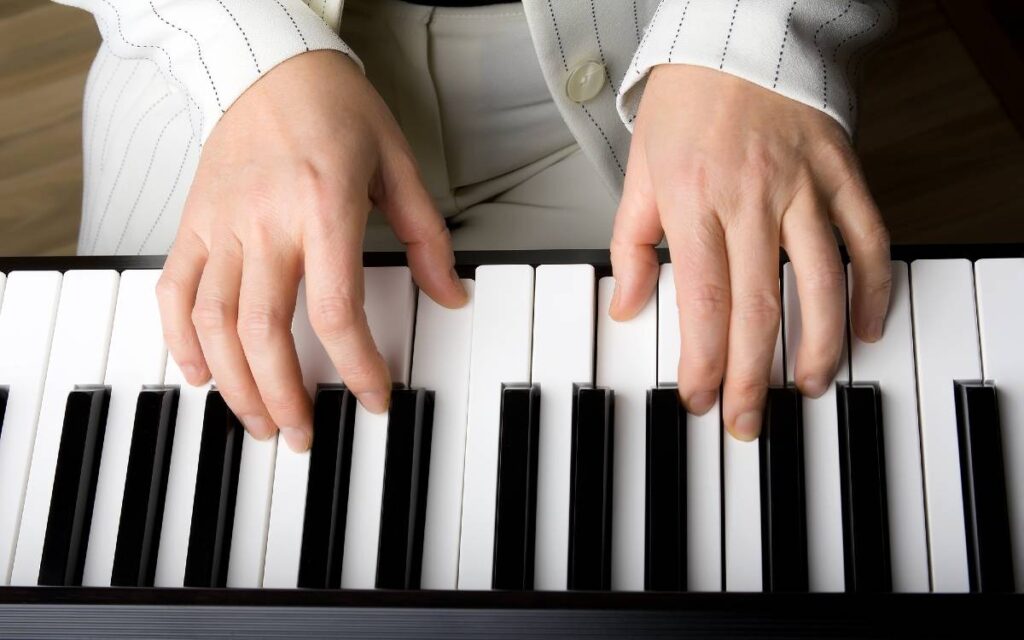
Playing the piano gives your hands a good workout.
All that stretching and movement gets the blood flowing. Hand workouts will help to prevent arthritis, and so piano playing is perfect for older learners.
Using your hands to play different dynamics on the piano helps to build strength and improves dexterity. You’ll find that other hobbies and tasks will become more accessible, like sewing, performing massages, or even typing on your laptop.
15. Improves your mental health and well-being
We’ve already looked at how it can help to reduce stress, and that, in turn, will improve your mental health. Aside from being a distraction from worries, it provides an outlet for expression.
But there are other aspects to piano playing where your mental health will also benefit.
Use it for escapism and lose yourself in the music. You don’t even have to play anything recognizable. Just making an original sound can be enough to shift your mood.
Many pieces of music reflect human emotion, so find one that uplifts you and pulls you out of your anxiety or depression.
16. Increases your IQ
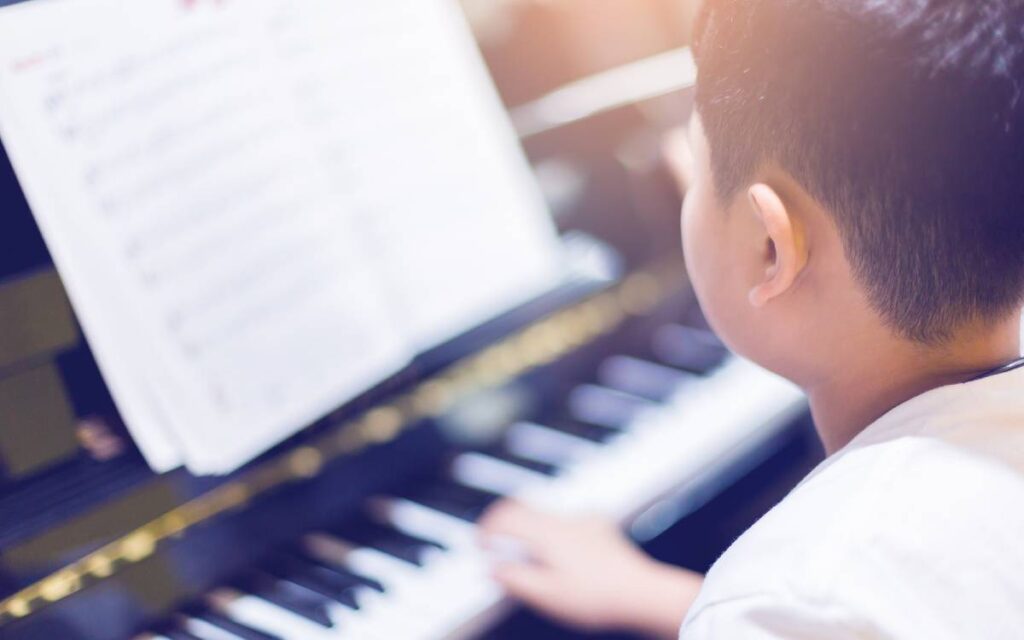
Have you heard about the Mozart effect? A theory from the 1990s suggested that if you listen to Motzart, you can increase your IQ for a short time.
The study showed that after listening to Mozart for 10 minutes, the test subjects showed an increase in the IQ scores of 9 – 10 points.
However, further tests also showed that it wasn’t only Motzart’s music that had this effect, but any music.
So we can see what happens to your IQ when you listen to music but what happens when you play music on the piano?
Research has shown that playing any instrument will make changes and developments to your brain that go beyond improving your IQ.
Musical training improves memory, problem-solving, and planning, and people who regularly practice piano can process information more quickly.
17. The piano brings people together
There’s something about a piece of piano music and the piano itself that draws people to it. We’ve all seen pianos placed in railway stations or other public places and that special moment when a random stranger sits down and plays the most amazing song.
People walk around with music within them and expressing that music via the piano is an incredible feeling.
If you find yourself at a party and see a piano, sit down and play a few songs and you can guarantee that it won’t be long before the whole room joins you and starts singing along.
18. It speaks a global language
There are some amazing things about music, one of which is that it has no boundaries. Regardless of the language that you speak, you feel and understand music. Even animals and our pets respond to the sound of music.
Whatever your musical preference, when you play piano, you can embrace music from all around the world and create a connection with other cultures.
19. Improves your hand-eye coordination
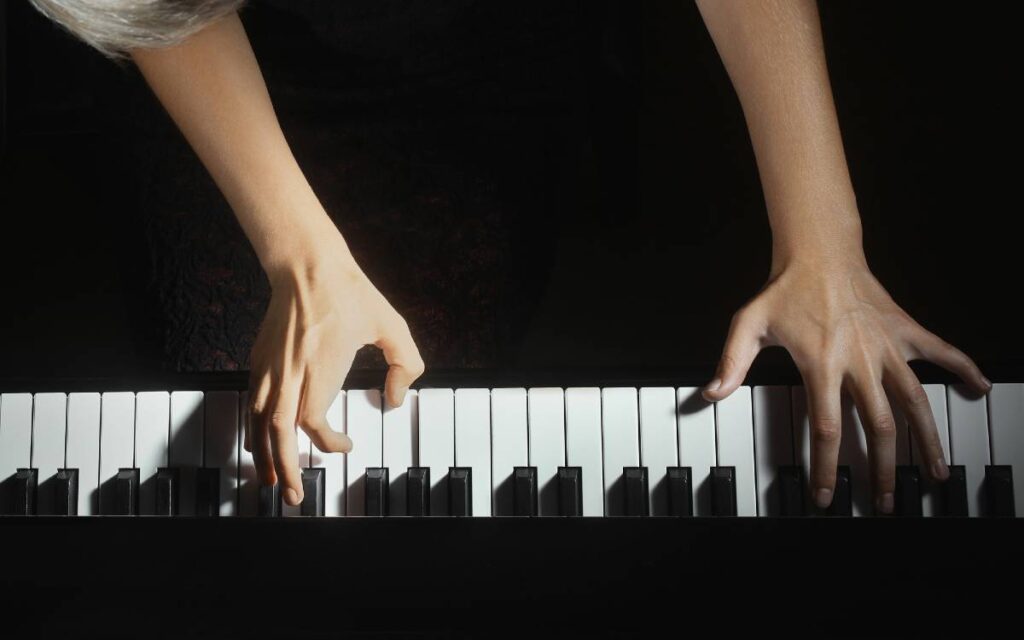
The majority of people are either left or right-hand dominant. When you first take piano lessons, it can be not easy at first to coordinate your hands. One hand plays the bass accompaniment while the other plays the melody.
But it’s what goes on deep within your brain that is most impressive. Your brain is working hard to coordinate different movements in your two hands.
The benefits of developing these skills go way beyond the keyboard. They increase your agility and reaction times.
20. It helps you to deal with criticism
If you want to go down the route of piano lessons from trained piano teachers, you will have to get used to criticism.
However, it will come in the form of constructive criticism, at least it should. If it’s anything but productive, it might be time to swap teachers!
As children, we are used to dealing with criticism from parents and teachers. But as we get older and become more stuck in our ways, it can be challenging to deal with criticism.
Piano students also have to learn how to accept criticism. Each time you have a lesson, your teacher will give you constructive feedback. Receive the input well, and you’ll continue to grow and learn.
Again, you can use the experience of receiving criticism from your teacher and adapt it to your life away from the piano.
21. Compose your own music
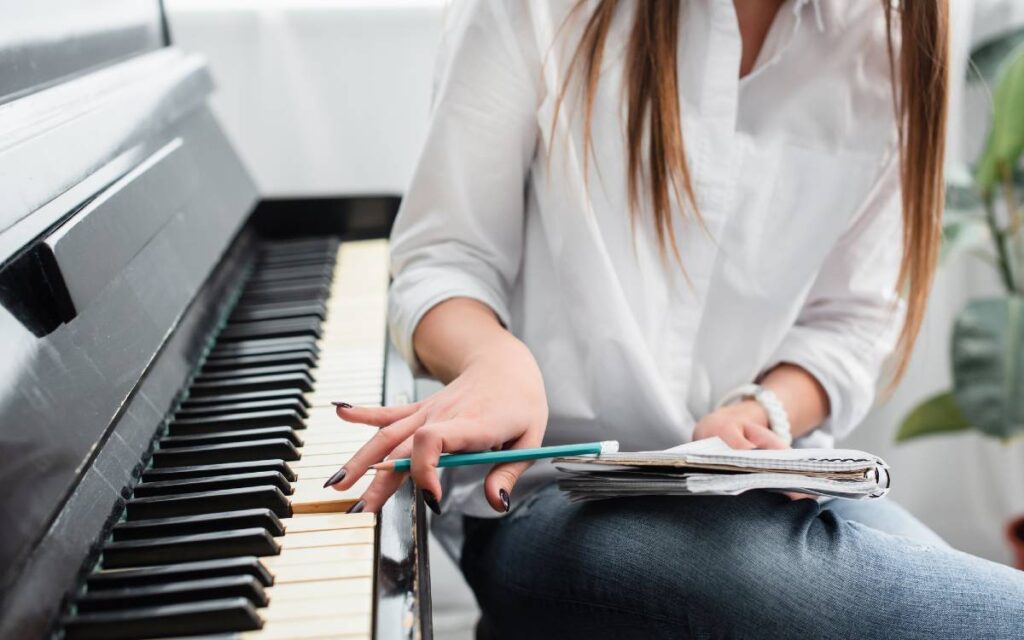
As your piano playing skills begin to grow, you could start to compose your own music. After all, why should we be confined to only playing the music that other people have composed?
You could include learning some music theory along with the practical side of playing the piano. But even without the theory, you can still create some incredible sounds.
If you invest in a digital keyboard, you can also record the sound as you make them. Introduce loops and other digital instruments, and before your know it, you’ll have created an entire piece of music.

